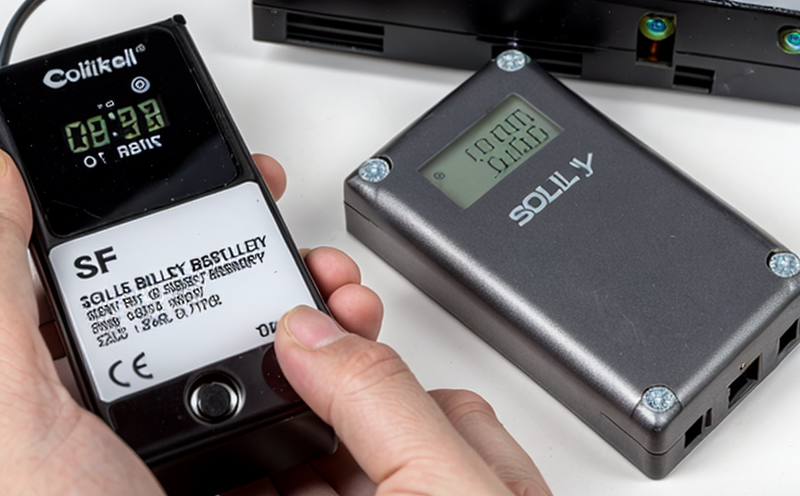ASTM F3146 Solid-State Battery Electrochemical Testing
The ASTM F3146 standard provides a framework for electrochemical testing of solid-state batteries. This service is crucial in the development and quality assurance of advanced battery technologies, particularly those used in applications like electric vehicles (EVs), portable electronics, and energy storage systems.
Solid-state batteries are gaining prominence due to their potential to offer higher energy densities, improved safety, and longer lifespans compared to traditional lithium-ion cells. However, the unique chemistry of solid-state electrolytes presents challenges that require specialized testing methods. The ASTM F3146 standard addresses these needs by specifying procedures for electrochemical impedance spectroscopy (EIS), galvanostatic cycling, and other key tests.
During electrochemical impedance spectroscopy, we evaluate the impedance across various frequencies to understand the internal resistance of the battery. This helps in identifying any potential issues with the solid-state electrolyte interface. Galvanostatic cycling involves charging and discharging the battery under constant current conditions to assess its capacity fade over time.
Another critical aspect is the use of appropriate reference electrodes, which are essential for accurate measurement of the cell voltage. The choice of reference electrode can significantly impact the test results, especially in solid-state systems where stray capacitances may influence measurements.
The testing process begins with precise specimen preparation, ensuring that the solid-state battery cells are intact and free from defects. This includes careful handling to avoid any mechanical damage or contamination that could affect the test outcomes. Once prepared, these cells undergo rigorous electrochemical characterization using state-of-the-art equipment such as potentiostats and impedance analyzers.
The data obtained from these tests is then analyzed to determine key performance indicators (KPIs) including specific energy, power density, cycle life, and thermal stability. These metrics are vital for understanding the battery's suitability for various applications. For instance, in EV applications, high power density is desired for fast charging capabilities, while long cycle life is crucial for extended vehicle range.
Our laboratory adheres strictly to ASTM F3146 guidelines to ensure that all tests are conducted under controlled conditions, replicating real-world operating environments as closely as possible. This approach helps in identifying potential weaknesses early on and allows for timely optimization of the battery design.
The results from these electrochemical tests provide valuable insights into the performance characteristics of solid-state batteries, enabling manufacturers to make informed decisions regarding material selection, manufacturing processes, and product development. By leveraging ASTM F3146 compliant testing, our clients can ensure that their products meet rigorous industry standards and are competitive in both technical and regulatory landscapes.
This level of precision and accuracy is essential for the advancement of solid-state battery technology. As we continue to refine our methods, we aim to stay at the forefront of this rapidly evolving field, providing reliable data that contributes to safer and more efficient energy storage solutions.
Why It Matters
The electrochemical testing of solid-state batteries as per ASTM F3146 is vital for several reasons. Firstly, it ensures the reliability and safety of these advanced battery systems by identifying potential failure modes early in the development process. Secondly, it helps in optimizing the performance parameters such as energy density and power output, which are critical for various applications.
For quality managers and compliance officers, this service provides a clear pathway to meet regulatory requirements and industry standards. R&D engineers benefit from detailed insights into how different materials and processes affect battery behavior, enabling them to innovate more effectively. For procurement teams, it ensures that the right suppliers are chosen based on consistent performance data.
The importance of ASTM F3146 cannot be overstated in an era where sustainability and innovation are key drivers for businesses across multiple sectors. By investing in thorough testing, companies can enhance their competitive edge while contributing positively to environmental goals.
Eurolab Advantages
At Eurolab, we pride ourselves on offering unmatched expertise in solid-state battery electrochemical testing. Our state-of-the-art facilities and highly skilled team ensure that every test conducted meets the highest standards of accuracy and reliability.
- Precision Instruments: We use advanced potentiostats and impedance analyzers to perform precise measurements, ensuring consistent and reproducible results.
- Experienced Staff: Our staff have extensive experience in battery testing and are well-versed with the latest ASTM F3146 guidelines.
- Comprehensive Reporting: We provide detailed reports that include all test parameters, enabling clients to make informed decisions quickly.
- Custom Solutions: Tailored services for specific client needs, ensuring that our testing aligns perfectly with their objectives.
In addition to these technical advantages, Eurolab is committed to sustainability and continuous improvement. Our commitment to excellence ensures that we are always at the cutting edge of battery technology testing.
International Acceptance and Recognition
The ASTM F3146 standard has gained significant recognition within the international community, particularly in regions focused on advanced energy storage solutions. Countries like the United States, Japan, and Europe have embraced this standard due to its robustness and applicability across various applications.
Our laboratory’s adherence to ASTM F3146 ensures that our testing results are widely accepted by regulatory bodies worldwide. This global acceptance enhances the credibility of our clients’ products in both domestic and international markets. Furthermore, compliance with these standards helps companies navigate complex certification processes more smoothly.
The widespread adoption of this standard also facilitates collaboration between researchers, manufacturers, and end-users, fostering innovation and knowledge sharing across borders. By aligning with ASTM F3146, Eurolab plays a pivotal role in advancing the global battery industry.





